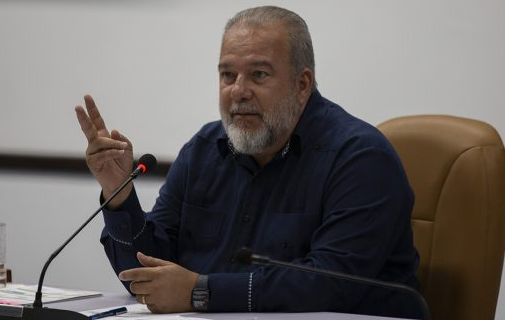Manuel Marrero Cruz, member of the Political Bureau of the Central Committee of the Communist Party of Cuba (CCPCC) and Prime Minister of the Republic, affirmed this Monday that Cuban culture in 2024, a particularly difficult year, was a fundamental pillar of the country’s political resistance, in order to maintain national identity and unity.
During the annual working meeting of the Ministry of Culture (Mincult), held in this capital with the presence of the First Secretary of the Central Committee of the Communist Party of Cuba (CCPCC) and President of the Republic, Miguel Díaz-Canel, the head of government praised the role of creators in the previous period despite the socioeconomic difficulties.
“We are proud of the writers and artists of the largest of the Antilles because with their work they contributed to social cohesion, to preserving the authentic values of the nation, and fostered the dialogue necessary to build a better country together,” said Marrero Cruz.
He stated that the PCC and the Cuban government are paying special attention to the sector within the Strategy to correct distortions and relaunch the economy, from a decolonizing and critical perspective.
The Prime Minister urged the protection of artists and intellectuals and their works, the internationalization of Cuban culture without making concessions to the hegemonic industries, and the fight on all possible platforms to confront the cognitive and symbolic war.
For his part, Agustín Pérez González, Director of Cultural Programs at the Ministry of Culture, explained that in 2024, despite the economic hardships and the disruptions to the electricity supply, no cultural events were canceled on the island.
He believed that thanks to the work of artists and intellectuals, the souls of the people were able to be relieved during difficult times such as the passage of hurricanes Oscar and Rafael and the earthquakes in the eastern part of the country.
According to Pérez González, it is necessary for the current period for artistic productions to transcend the stages of the capital so that audiences throughout the archipelago can come into contact with these creations.
Alexis Triana Hernández, president of the Cuban Institute of Cinematographic Art and Industry (ICAIC), commented on how the Caribbean nation’s policy of special attention to the seventh art led to the relaunching of the Film Commission last year, the creation of high-quality programs at the Animation Studios, and the reactivation of the Cubanacán Film Studios.
“With the independent audiovisual collectives, with which ICAIC has strengthened its ties, some 217 works were filmed, 10 of them feature films that will soon be released on the big screen,” he reported.
He asserted that it is urgent to defend Cuba’s film heritage, to which foreign associations contribute, having collaborated to restore two episodes of the animated film Elpidio Valdés and allowing the recovery of the film Vampires in Havana on its 40th anniversary.
According to Triana Hernández, filmmakers’ cameras should be in the neighborhoods to tell people’s stories and pass them on to new generations.
Abel Prieto Jiménez, president of Casa de las Américas, insisted on creating an anti-colonial and anti-fascist front through culture.
It will be essential to have a Cultural Policy Observatory that will allow for a hegemonic counteroffensive and wage a battle against the avalanche of commercial junk arriving from various sources.
Alpidio Alonso Grau, head of Culture, noted during the assessment that an action plan with eight objectives and actions is planned for this year that will give priority to certain areas of creative activity in the country.
The minister explained that work will be done to promote the arts and literature from a decolonizing perspective, including in the media. This will be reflected in the attention paid to the Cuban National Ballet and the teaching of this artistic expression, as well as in other goals, including the implementation of the Comprehensive Policy for the Commercialization of the Visual Arts.
He emphasized the importance of protecting the country’s heritage and historical memory through interactive museums and the rescue of numerous institutions that are currently in disrepair and require significant funding for their restoration.
Alonso Grau emphasized the need to elevate the quality of cultural programming in every space and, especially, in the communities through the presence of professional artistic groups as well as amateur talent.
Communication of all institutions, including the Institute of Information and Social Communication, the Union of Writers and Artists of Cuba, and the Hermanos Saíz Association, to promote quality cultural products.
“We must constantly vindicate Cuba in every physical and digital space to defend the Revolution and its culture,” the minister stated.
The annual working meeting of the Ministry of Culture was also attended by Marydé Fernández López, member of the CCPCC and deputy head of the Ideological Department, and Inés María Chapman Waugh, deputy prime minister of the Republic.


